Hulu has transformed streaming services by offering personalized ad experiences through real-time ad insertion. With options like Hulu Live TV, the Hulu app, and the Hulu Disney Max bundle, viewers enjoy flexible entertainment while advertisers benefit from precision targeting.
Whether on Hulu with ads, Hulu No Ads, or Hulu without ads plans, the platform leverages a robust digital marketing platform supported by advanced digital marketing tools. Behind the scenes, Hulu relies on robust software testing services, including automation testing frameworks, A/B testing software, and load testing tools such as JMeter load testing and K6 load testing to ensure ad delivery at scale.
This integration of automation tools for testing with digital marketing services guarantees a seamless and engaging TV streaming experience.
💡 What’s next? Keep scrolling to find out:
🚀 Introduction to Hulu’s Dynamic Ad Delivery System
🚀 What Is Dynamic Ad Insertion (DAI) in Streaming?
🚀 How Regression testing and QA services ensure accuracy and performance?
🚀 Challenges in Delivering Ads at Scale.
Introduction to Hulu’s Dynamic Ad Delivery System
Hulu transforms the streaming market with its dynamic ad delivery system, combining Hulu Live TV, the Hulu app, and the Hulu Disney Max bundle into one personalized service. It uses server-side ad insertion, dynamic ad insertion, and first-party data to deliver precise targeting and relevant ad variations across live streams and diverse content.
The platform powers audience engagement with interactive ad formats, call-to-action features, and real-time tracking, outperforming traditional linear TV advertising. By optimizing program genres, ad frequency, and localized data, Hulu Advertising drives stronger sales conversion and boosts ad sales across FAST platforms like Pluto TV, Tubi TV, and Samsung TV Plus.
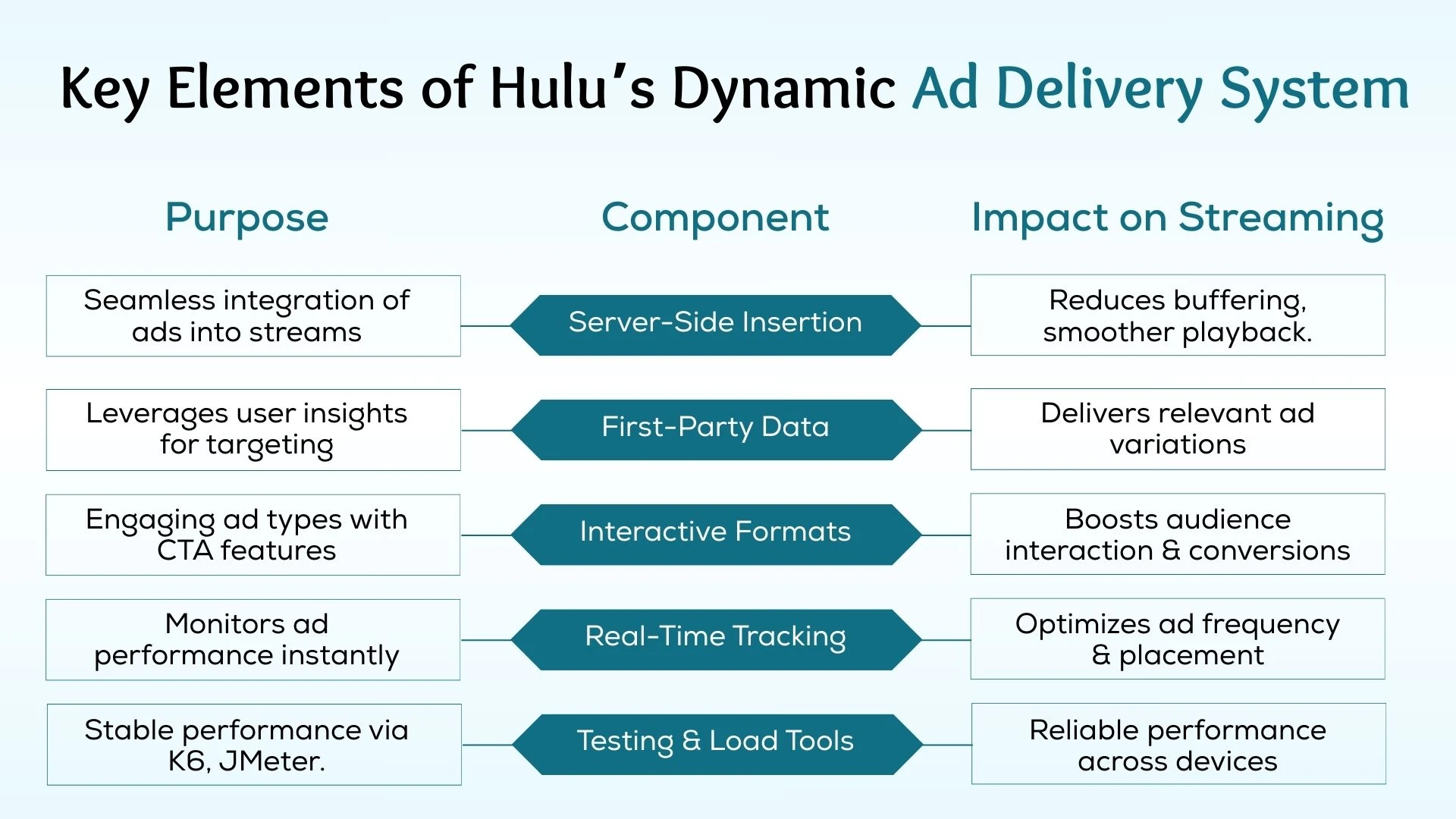
Hulu maintains performance through software testing services, automation testing frameworks, and load testing tools like K6 load testing and JMeter load testing. This ensures smooth digital experiences for internet-connected TVs, Apple TV, and smart TVs, making it a leader in the CTV advertising market strategies.
What Is Dynamic Ad Insertion (DAI) in Streaming?
Dynamic Ad Insertion (DAI) is reshaping how streaming services deliver ads across TV streaming services and digital marketing platforms. It enables media companies to insert targeted ads in real time, improving audience engagement and ensuring seamless content delivery on smart TVs and internet-connected TVs.
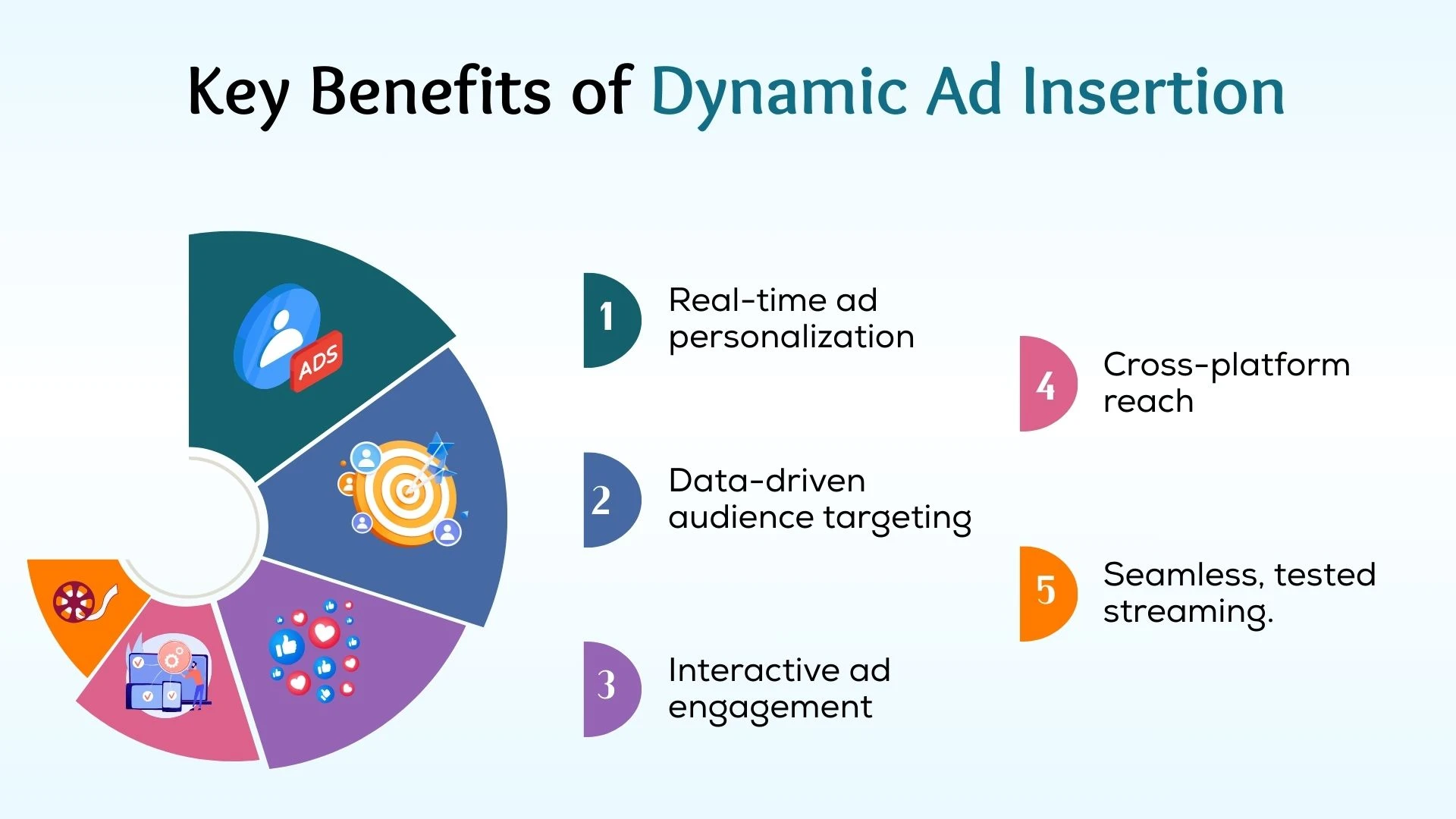
Key Features of Dynamic Ad Insertion (DAI):
- Uses client-side ad insertion and server-side ad insertion to optimize ad variations and reduce disruptions during live streams.
- Applies big data insights, granular data, and advanced targeting capabilities for precise audience segments.
- Enhances interactive elements with ad selectors, interactive content, and Call to Action tools that boost sales conversion.
- Supports programmatic platforms like FAST platforms, YouTube TV, and LG Channels to expand reach across diverse content.
- Relies on load testing software and automation tools for testing to ensure smooth video pipelines and adaptive streaming with DRM keys.
How Hulu’s Ad Tech Makes Real-Time Decisions?
Hulu’s ad tech uses real-time tracking and dynamic ad insertion to deliver personalized digital experiences across smart TVs, Apple TV, and internet-connected TVs. By applying big data insights and data analytics, Hulu optimizes content delivery and ensures smooth video pipelines for its global audience.
The platform applies first-party data, advanced targeting capabilities, and granular data to reach precise audience segments. Hulu’s system adapts ad frequency, chooses relevant program genres, and leverages interactive ad formats to maximize audience engagement.
With programmatic platforms, FAST platforms, and partnerships with media companies, Hulu drives stronger ad sales and sales conversion. Its advertising strategy supports localized data, dynamic content optimization, and scalable streaming media solutions, making it a leader in the CTV advertising market and the media and entertainment companies space.
Personalization in Hulu Ads: Matching Content to Viewers
Hulu Advertising delivers personalized service experiences by combining dynamic ad insertion, first-party data, and big data insights. Ads are tailored for viewers across smart TVs, Apple TV, and internet-connected TVs, driving engagement in the growing streaming media and CTV advertising market.
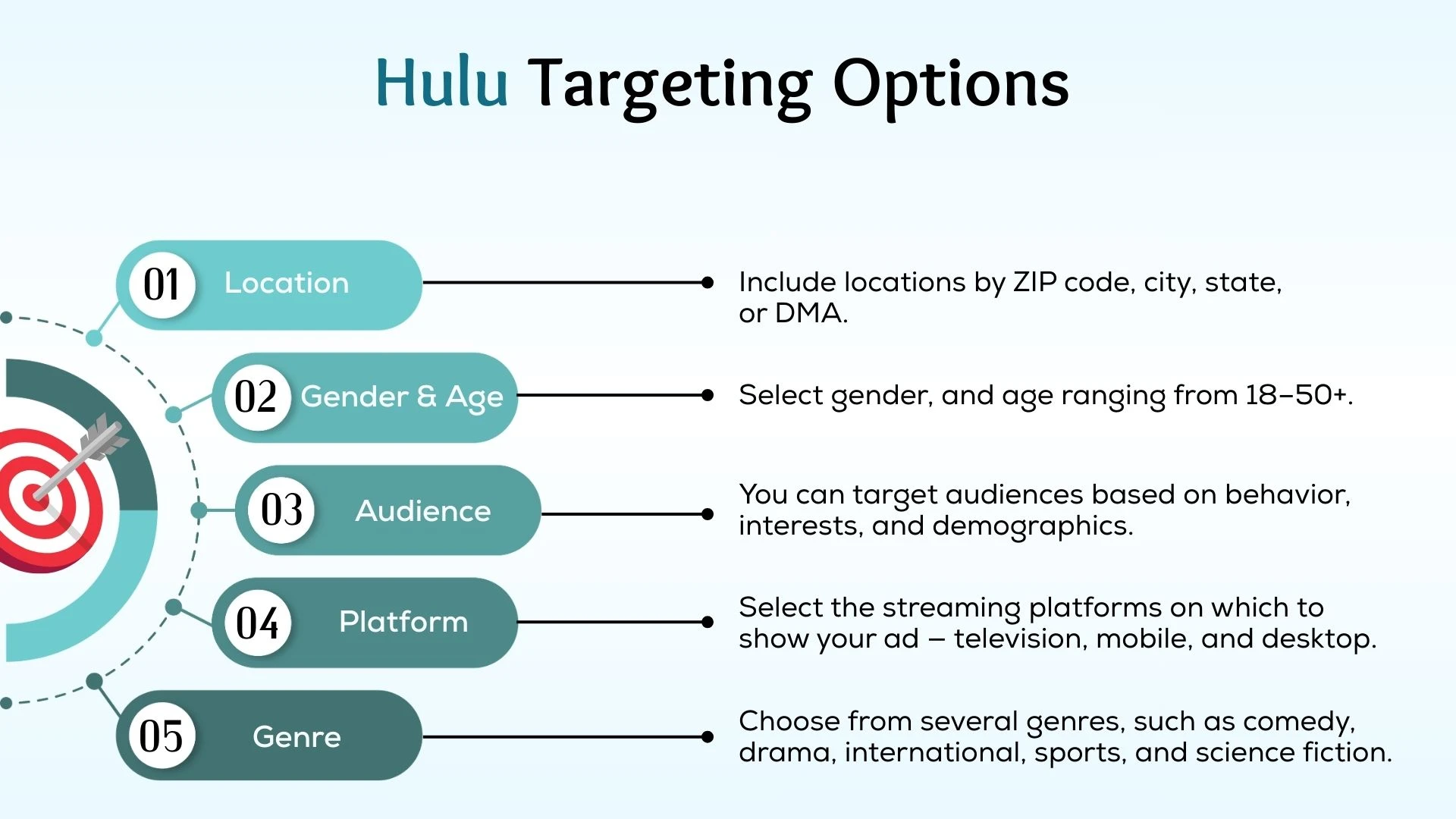
- Uses first-party data and granular insights to segment audiences and optimize ad frequency.
- Leverages dynamic content optimization and real-time tracking to match ads with user interests and improve conversions.
- Enhances engagement with interactive ad formats, program-based variations, and relevant genres.
- Expands reach through FAST partnerships with Tubi TV, Pluto TV, and Samsung TV Plus.
This strategy ensures personalized service, effective targeting, and stronger ad sales for media and entertainment companies.
The Technology Stack Behind Hulu’s Ad Delivery
To maximize streaming, Hulu's sophisticated ad technology employs client-side, server-side, and dynamic ad insertion. By applying first-party data, granular data, and big data insights, it ensures precise targeting and smooth content delivery.
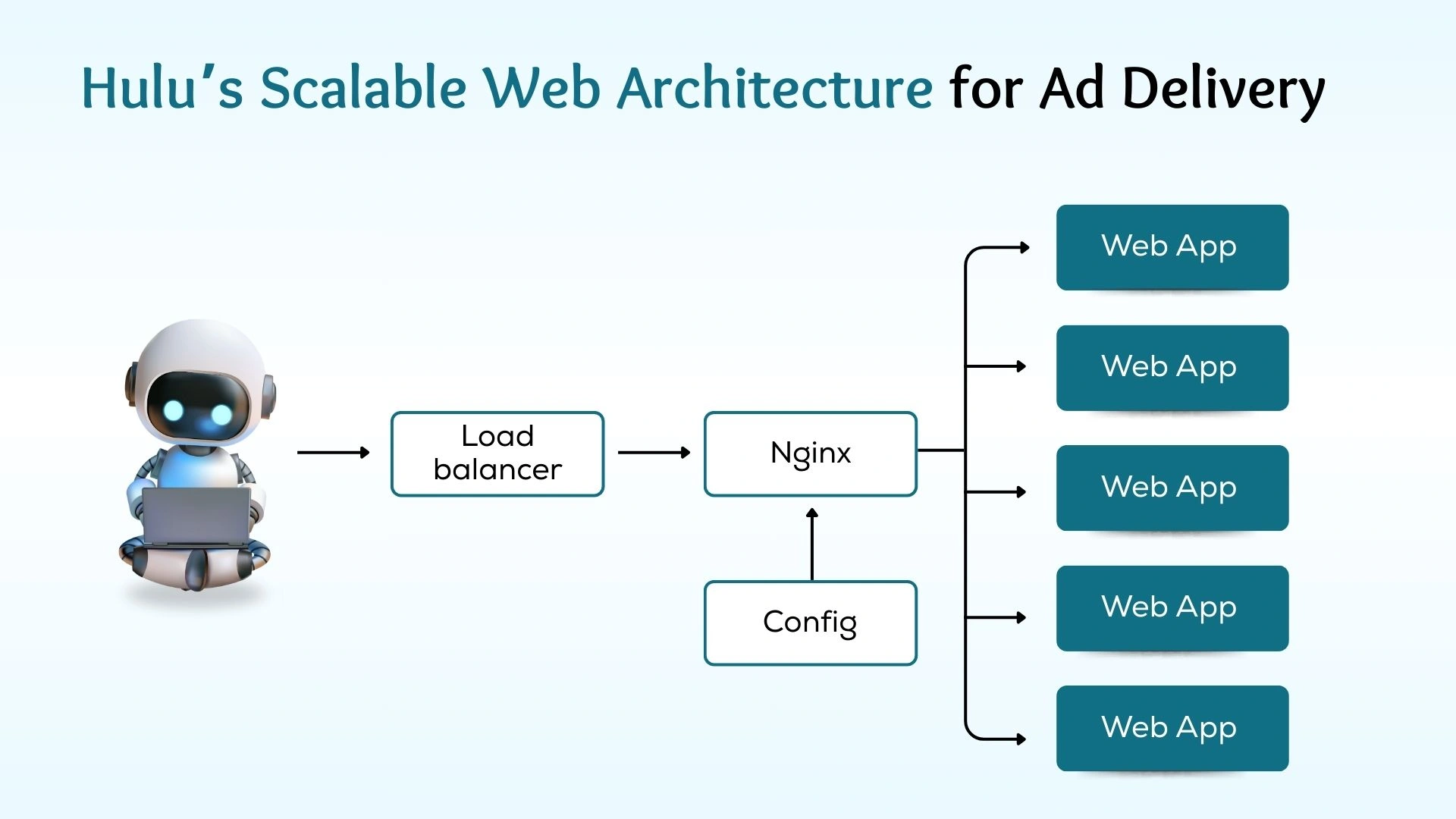
The system supports video pipelines, an adaptive bitrate set, and secure DRM keys to protect its content library. Through dynamic content optimization, real-time tracking, and advertising order management systems, Hulu boosts ad sales, improves sales conversion, and enhances the digital experiences of ad-supported subscribers across smart TVs, FAST platforms, and the global CTV advertising market.
Real-Time Bidding (RTB) and Programmatic Advertising on Hulu
Hulu powers real-time bidding (RTB) through programmatic platforms, enabling media and entertainment companies to deliver targeted ads with advanced targeting capabilities. By leveraging granular data, localized data, and first-party data, the platform enhances audience engagement while ensuring seamless content delivery across live streams and internet-connected TVs.
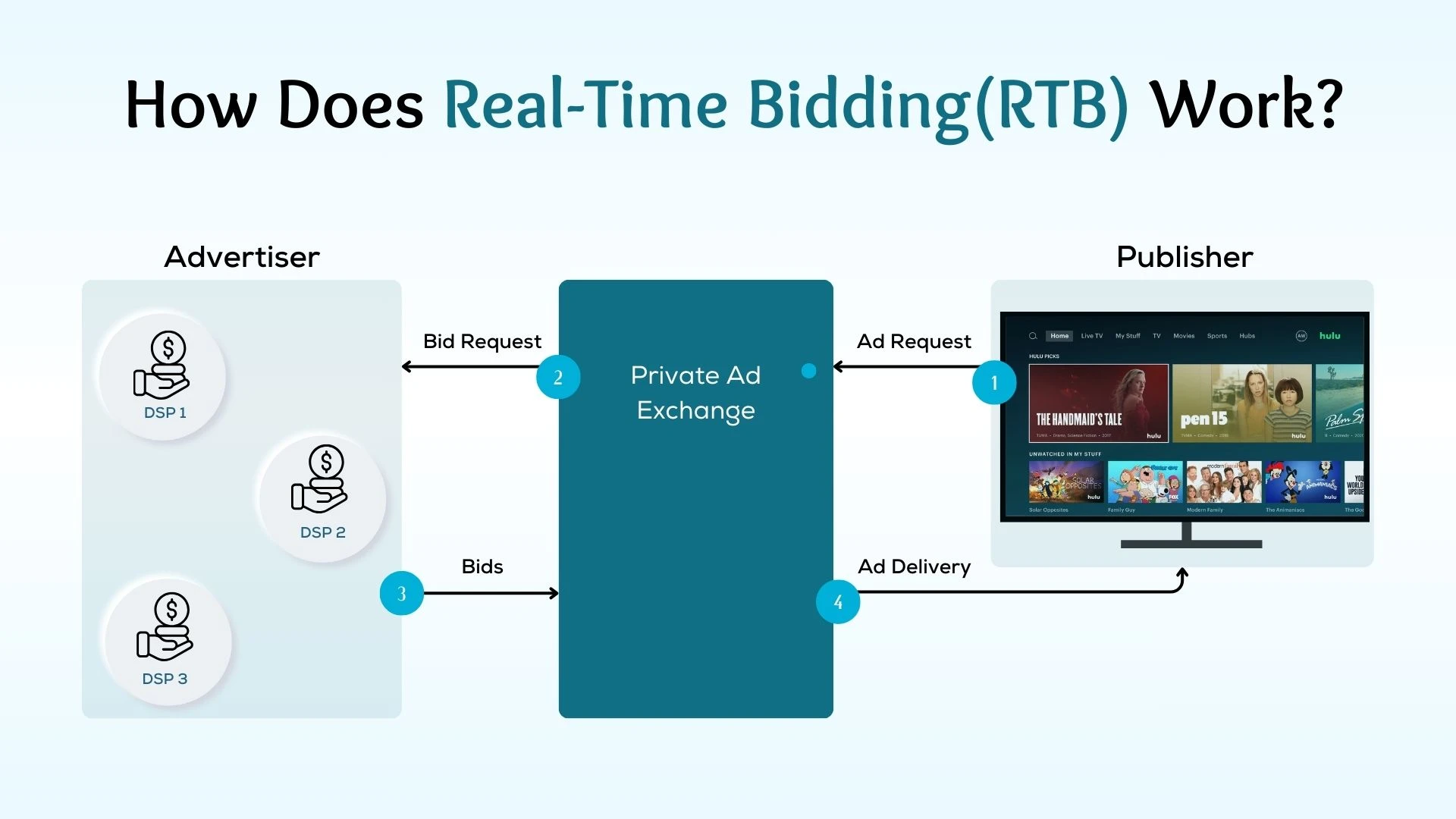
Through dynamic ad insertion, ad selector tools, and interactive ad formats, Hulu maximizes ad sales, boosts sales conversion, and improves performance measurement in the CTV advertising market. Its strong advertising strategy and real-time response provide advertisers with precise targeting, better ad frequency control, and optimized call-to-action results across FAST platforms like Pluto TV, Tubi TV, and Samsung TV Plus.
In addition, Hulu’s programmatic advertising streamlines campaign management by automating ad buying and placement. This ensures faster execution, cost efficiency, and better audience targeting for media and entertainment companies in the evolving CTV advertising market.
How Hulu Balances Ad Revenue with User Experience
Hulu ensures a smooth balance between ad revenue and user experience by optimizing its streaming services and advertising strategy. The platform uses real-time response systems and audience segmentation to personalize ad delivery while keeping content enjoyable.
- It applies ad frequency control and interactive ad formats to avoid ad fatigue.
- Hulu integrates dynamic ad insertion with ad selector tools for flexible viewing choices.
- Through performance measurement and sales conversion analysis, it strengthens advertiser ROI and audience engagement.
- Its CTV advertising market focus aligns with platforms like Pluto TV and Samsung TV Plus, ensuring scalable ad sales growth.
By combining content delivery efficiency with personalized targeting, Hulu boosts customer satisfaction and ad effectiveness across global markets.
Testing Hulu’s Ad Delivery for Accuracy and Performance
Media and entertainment platforms like Hulu prioritize software testing services and automation testing frameworks to ensure accurate ad delivery and seamless playback. These practices verify targeting precision, streaming quality, and campaign performance across smart TVs, live streams, and mobile apps.
Key Testing Practices Include:
- Load Testing (k6, JMeter): Confirms stability during peak traffic.
- Automation Testing (Selenium, End-to-End): Validates real-time ad placement.
- A/B Testing & Penetration Testing: Improves ad performance while detecting vulnerabilities.
- Continuous QA Testing Services: Optimize campaign accuracy and reliability.
By integrating testing automation technologies, platforms such as Hulu deliver ads that are tailored, secure, and performance-driven, ensuring stronger results for advertisers.
Automation in Testing Hulu’s Ad Insertion Process
Hulu applies AI automation testing and advanced test automation frameworks to validate every step of its ad insertion process. With selenium test automation and mobile app test automation, the platform verifies ad performance across the Hulu app, Hulu Live TV, and connected devices.
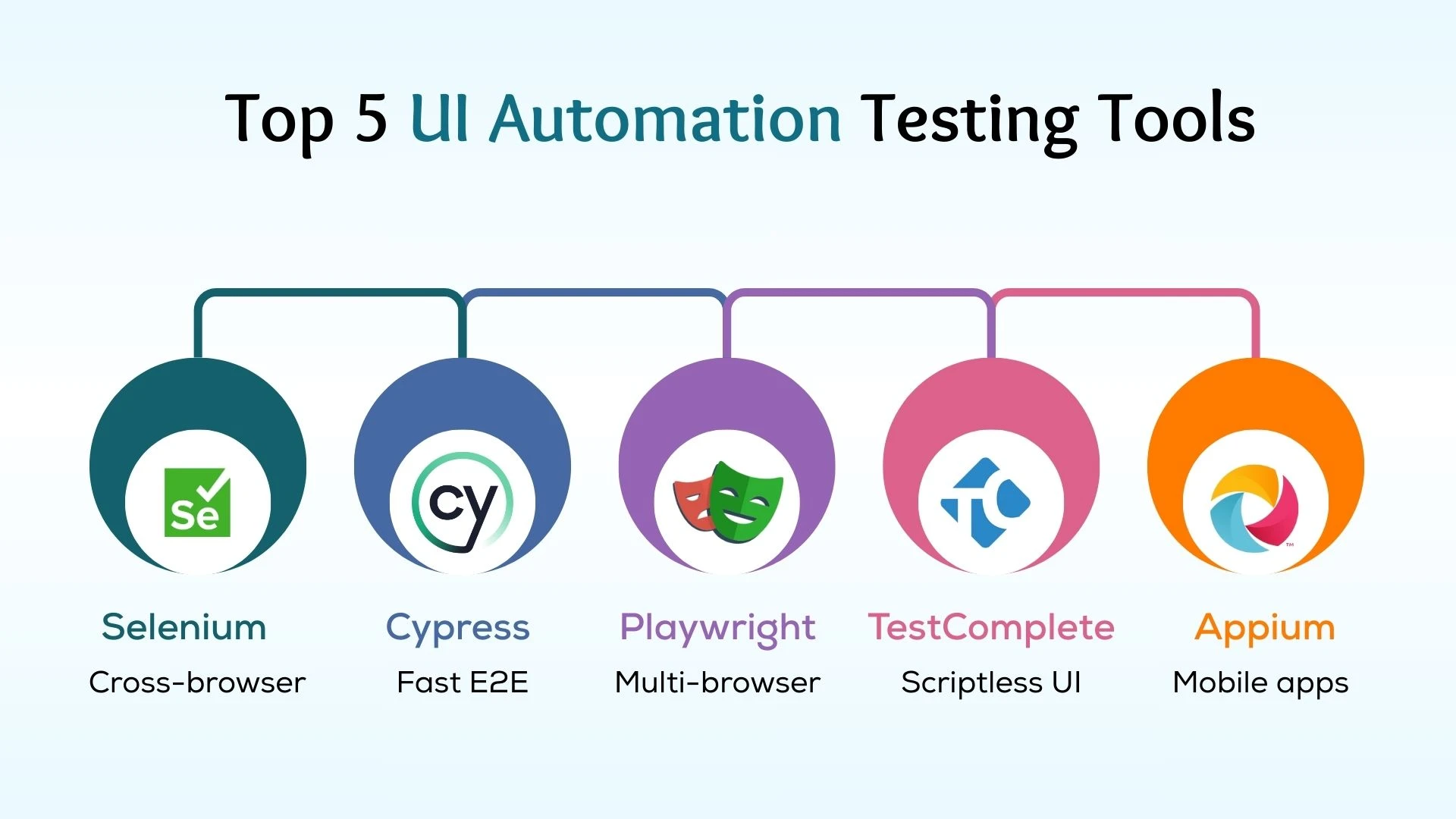
By integrating automated QA testing tools with regression testing and data-driven testing insights, Hulu ensures ads load instantly and match user preferences. Teams combine software QA testing, end-to-end automation testing, and continuous integration pipelines to detect errors in real time. This active use of test automation services improves scalability while guaranteeing accurate, secure, and consistent ad delivery for millions of viewers.
Hulu’s Approach to Ad Frequency and Relevance
Hulu optimizes ad frequency and relevance with precision by combining AI automation tools, quality assurance testing, and data-driven insights. This approach ensures that every ad improves engagement while protecting the overall user experience.
Hulu uses AI-powered testing tools and software QA testing to balance repetition with fresh ad content.
- Engineers apply test automation frameworks and self-healing automation to keep ad placement consistent across the Hulu app and Hulu Live TV.
- With predictive analysis and automated test generation, Hulu delivers personalized ads that match viewer interests while optimizing ad revenue.
By actively integrating automation testing tools with continuous integration, Hulu ensures ads remain both relevant and non-intrusive.
Challenges in Delivering Ads at Scale
Hulu faces multiple challenges in delivering ads at scale, but it actively applies software testing services, AI automation testing, and QA testing to maintain accuracy and performance.
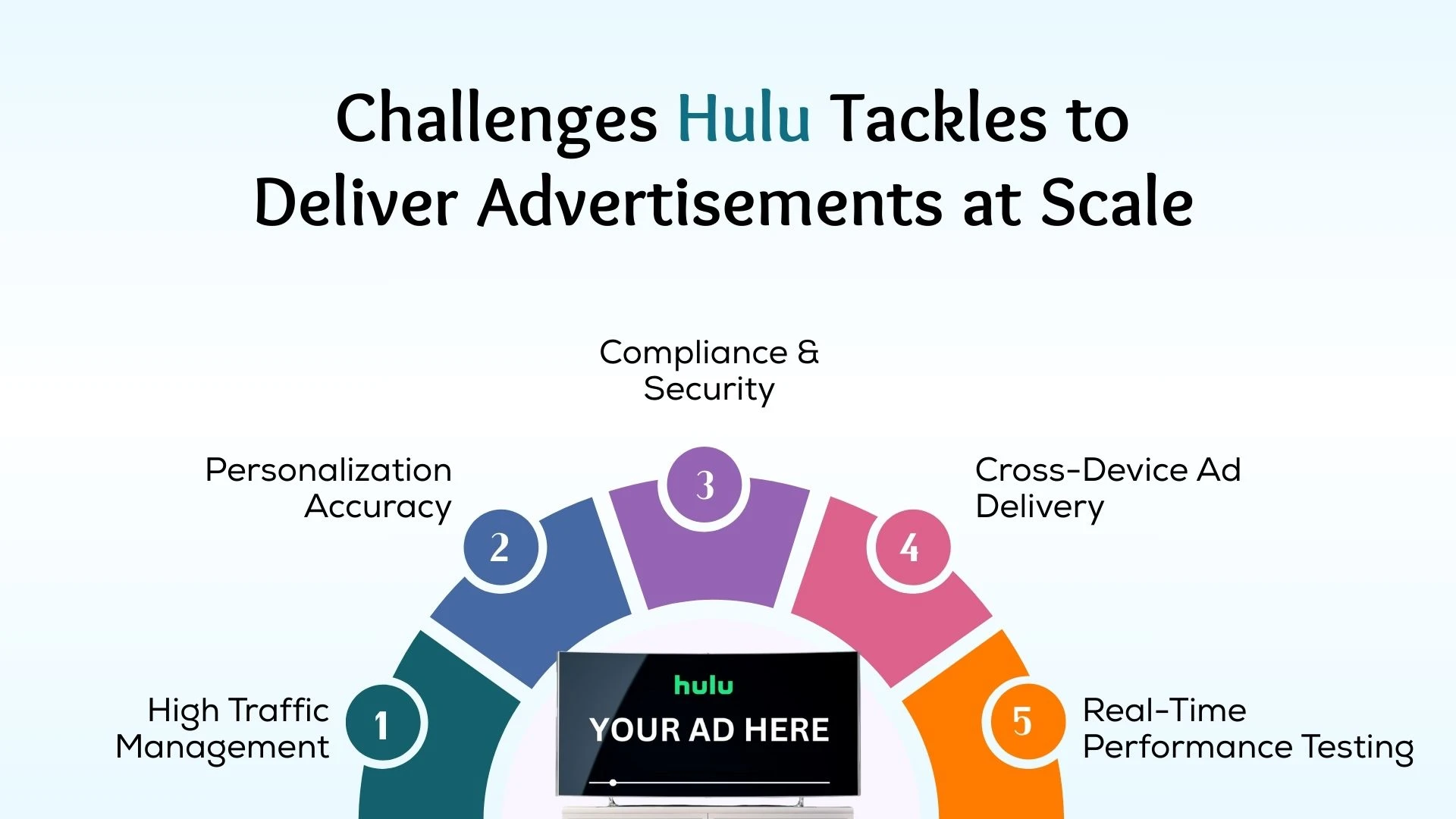
- Ad latency during peak streaming: Hulu uses test automation frameworks and continuous integration to optimize ad load times.
- Maintaining personalization accuracy: Engineers deploy predictive analysis, LLM AI, and data-driven testing insights to match ads with user preferences.
- Ensuring compliance and security: Hulu applies security testing tools, regulatory compliance checks, and automated QA testing tools to safeguard ad delivery.
By combining manual testing with AI-driven test automation services, Hulu ensures scalable, relevant, and secure ad experiences.
Data Privacy and Compliance in Hulu’s Ad Targeting
Hulu actively prioritizes data privacy and ensures regulatory compliance by applying GDPR standards, ISO 27001 security controls, and strict privacy policy frameworks. Its QA testing services and security testing tools validate that personalized advertising remains transparent, lawful, and aligned with US streaming regulations and the global OTT market.
The platform uses automated QA testing tools, data-driven testing insights, and risk and security frameworks to safeguard user data during targeted advertising. By enforcing compliance protocols and monitoring third-party vendors, Hulu builds trust while delivering relevant ads. This balance of automation testing and information security helps Hulu maintain accuracy, strengthen consumer confidence, and drive sustainable ad performance worldwide.
Conclusion: Why Hulu’s Real-Time Ad Decisions Matter
Hulu’s ability to make real-time ad decisions defines its strength in the competitive digital payments, fintech, and software testing services ecosystem. By combining automation testing tools with QA testing software tools, Hulu ensures accurate, relevant, and scalable ad delivery for diverse audiences.

This balance of security testing, test automation, and manual testing tools helps Hulu deliver seamless ad experiences while protecting data privacy. As the digital payments industry and fintech software evolve, Hulu’s commitment to precision-driven software QA testing highlights why real-time ad optimization matters for both advertisers and viewers.
Frugal Testing Company delivers functional testing solutions and cloud-based test automation services, ranking among the top software testing companies in the USA.
People Also Ask
1. How does A/B testing help improve ad engagement rates?
A/B testing compares ad variations, enabling Hulu to optimize engagement rates through data-driven testing insights and software QA testing.
2. What is the CPM for Hulu?
Hulu’s CPM varies by campaign, but advertisers gain value with targeted programmatic advertising and real-time bidding strategies.
3. What role does regression testing play in maintaining ad delivery consistency?
Regression testing ensures automation frameworks keep Hulu’s ad delivery stable, accurate, and consistent across devices and platforms.
4. Does Hulu test new ad formats with small audiences before rolling out?
Yes, Hulu conducts controlled tests with smaller audiences, using manual testing tools and automated QA testing before large-scale rollout.
5. How are bugs in ad playback identified and resolved?
Bugs are detected through continuous QA testing and resolved using test automation frameworks for seamless ad playback.





%201.webp)

